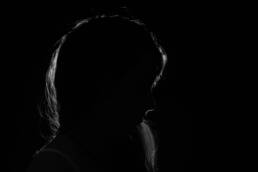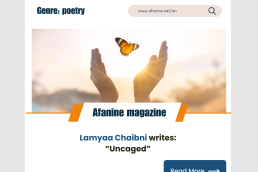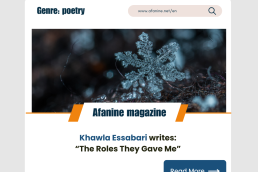Dissing the core of selfhood: The dark side of selfhood
I remember the first time I was called by the void, the scenery was picturesque and suitable for letting go of life, I even had a waterfall to my right, gushing clear water over the rough rocks. I also had an audience in awe watching little me from over the slicing sharp cliffs, all paralyzed and breathless from the intensity of the scene. I remember my rather resting heart rate, the welcoming clear water pool, at what seemed to be an infinite distance from my dangling feet, which were dressed in my favorite red Velcro shoes. I also recall asking myself: What if I simply let go? Will the density of the water be enough to protect my spine from breaking? Will I survive and write about the beauty of floating in the air? Can I possibly grow wings and fly? What is beyond the undoable? What comes after braving the tempting boundaries of recklessness? I would love to believe that I was not by any means depressed or self-destructive at the age of ten, but I was submerged in speculative curiosity for the unknown. This near-death experience introduced me to the evanescent nature of life, and later on, everything else followed the description: happiness, love, family, peace… and this newly realized reality triggered more calls by the void, and severe Xanax-resisting anxiety, and undeniably constituted the largest pattern of my identity: my psychological handicaps.
Ten years after my first Appel du vide, I still get these disturbing urges to do exactly the opposite of what the politically correct consciousness allows. Whether it’s jumping off high places, being unimaginably rude to my superiors, cutting off electricity during surgeries, stabbing myself, or the famous urge of stripping down to my birthday suit during interviews, the aim is one: escaping stressful situations by imagining the worst and most daring thing that I can do. It used to scare me sometimes, especially the way I could picture these deranging imps, to the point where I always had this disturbing conviction in the back of my mind, that one day I would snap back to reality to find that I walked into traffic or something, now I find it just amusing! Having the “Imp of the perverse” as Edgar Allan Poe named it, is far from having death wishes, or social suicide wishes, but it is defined by Freud as a way for the primitive brain to thrive for freedom and lightness, because when one loses everything, that’s where a lighter existence begins. I can interpret it by comparing this lightness to that bird you see flying up in the sky, flapping its wings gracefully, braving the layers of the air, now imagine how better this bird can do at flying if it could fly in the void, where there is no friction and no air resistance. As a thriller writer, I find it satisfying and enjoyable to let my capable hands write an impulsive destiny for my characters, by answering a fair amount of the calls they, and I the writer, have been getting, it somehow tamed down the frequency of these calls, and inspired my plot twists.
Having the imp of the perverse was more or less rewarding, but on the other hand I have been struggling with a more serious handicap: Anhedonia; I am unhappy and incapable of feeling happiness, and it is probably due to the abrupt tragedies life had generously granted me with, hence, I am always expecting bad things to occur. Life always had an inkling towards using my family as a tool to create these tragedies. The one tragedy I can share with you without ruining my family’s reputation is being born last; other than having the smallest section in the family photo album, being benjamin has many other cons, such as loneliness. I was a lonely introvert as a child, I couldn’t fit with other kids because they were so loud and dynamic, and I was a quiet board-games girl, moreover, my siblings whom I could fit with the most were always at school. The irony of destiny had also decided to coincide the day I am writing this sad essay of candor, with the same day my last remaining sibling went abroad, and I am frankly starting to feel tremendously lonely as I am writing this essay. Therefore, In addition to having a lonely childhood, I am also lonely at this time of my life when I have reached the apex of my conversing eloquence and my generous loving skills. I also feel like my older siblings got much more time with my parents whereas, I am now left to mope around with whatever’s left of their patience and love, and most importantly health, and this hollowing feeling is a tragic source of anxiety and sadness for me. An acidic sadness, dark and insatiable, lingering around my gut and every other organ, it is so concrete that if you slit through me, it will spill out on the floor then eat through it and form a deep hole. My physical sadness is most tangible when I inhale, sometimes it feels like that dark liquid sadness is taking up so much space, and consequently leaves none for my lungs to expand, hence, all my organs are cramming inside me, suffocating.
The list of writers who suffered from certain psychological pathologies such as depression is a lengthy one; J.K.Rowling, Guy de Maupassant, Edgar Allan Poe, Leo Tolstoy, Charles Baudelaire… and the longer this list gets, the more my handicaps are spoiled and fed to satiety. I am shamelessly one of those people who believe that if one’s suffering and madness is channeled towards creativity, the outcome can be outstanding. I have experienced it myself, as my most satisfying pieces are the ones I have written in my hardest times, and it is likely due to how sadness slows down my thinking stream and makes me more thoughtful. In the grand scheme of things, I can say that as a writer, I am grateful for the tragedies I have witnessed, because without them, I wouldn’t be aware of what emptiness, hopelessness or terror feel like. I am also grateful for all the books I have read, which were full of figures and analogies that inspired me to write and to mourn sadness eloquently. I know for a fact that many of The Olive Writers participants feel the same way about their lives, because I was overwhelmed by how beautifully they can also describe tragedies, but I couldn’t help but to feel guilty and sorry for the fact that we are all sinners, in terms of glorifying tragedies and psychological handicaps.
I do not reckon that a mind at peace can be easily dragged into the deepest and most rewarding levels of self-discovery, which can lead to a louder form of existence, a form that others can love and relate to. However, I do not encourage dwelling into melancholy or to prey on trivial existential paradoxes to create better, because happiness and positivity -as sickening as they seem to be- can inspire beautiful pieces of literature. Voltaire and Raffaelle Monti were relatively happy artists, as well as Shakespeare and Saint-Exupéry, and they were great, the greatest actually. So to summarize, write freely, but please dare to be happy, dare to not suffer for your art and get some natural sunlight for fuck’s sake, it will do you good.
We belong
Near the silhouette of trees, where dark and light meet, we belong
Where lonely leaves sang their rustic song, we sang along
There the night brought her close, a nymph of trees
Infusing the stale air with her summer breeze
I composed notes on her silent lips, drank the sweet desire
That surrounds the darkness like Heraclitus’ fire
On the chariot of her lips, I studied the fire in her eyes
Like Parmenides charioted by the daughters of Helios to the truth of skies
But will she understand the layers untold,
And the heart of a mad poet where desires unfold?
That blasphemous need to fill the silence with lines half-broken!
To uselessly articulate the sacredness of the unspoken
But some things deserve to be captured, I’ve been told
Like beautiful pictures in shelf of memories with frames of gold
I captured her beauty, I invented her. Is it a crime?
To bury a Goddess in the semblance of a rhyme?
Houdna Rguib.
Afanine
مجلة أفانين: هي منصّة إلكترونيّة حرّة، وشاملة، ومتنوّعة، تديرها جمعيّة كتّاب الزيتون والمعهد اللغوي الأمريكي بالدار البيضاء، وتضع على عاتِقها أن تفتحَ نافذةً، للكتّاب والفنّانين في المغرب، نحو آفاق الإبداع. تنشر المجلة أعمالًا أدبية وفنية للكتاب والفنانين الشّباب بالمغرب، بالإضافة إلى مقابلات، وبروفيلات، وفرص، وصور فوتغرافية، وغير ذلك. تروم المجلة تسليط الضّوء على إبداعات الكتاب والفنانين الصّاعدين بالمغرب.





